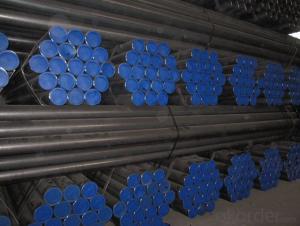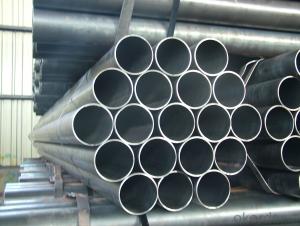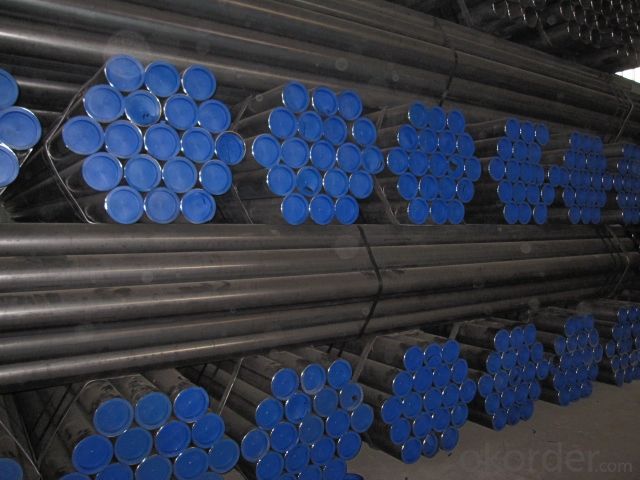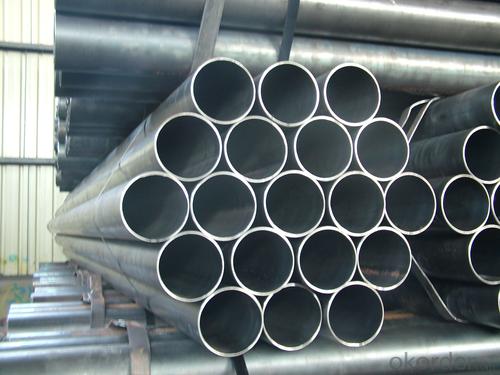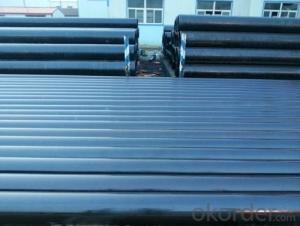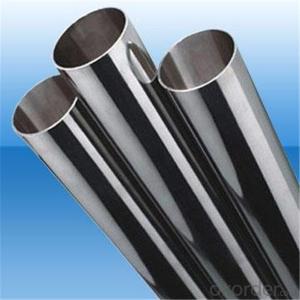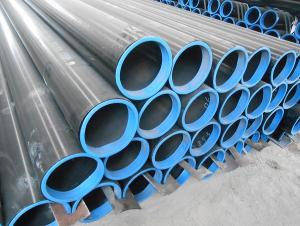Best roller pipe for mining industry
- Loading Port:
- China Main Port
- Payment Terms:
- TT OR LC
- Min Order Qty:
- -
- Supply Capability:
- -
OKorder Service Pledge
OKorder Financial Service
You Might Also Like
Outside diameter | 1/2”-12” |
Wall Thickness | 1.0 -12mm SCH40,60,80, etc. |
Tolerance | ±5% |
Material | Q195,Q215,Q235,Q345 |
Quality grade | First grade |
Section Shape | Round |
Surface Treatment | Hot rolled and ERW |
Technique | Hot rolled |
Ends | Threaded Ends, Grooved Ends |
Length | Less than 12m |
MOQ | 10 Metric Ton or as your request if normal size |
Deliver Time | Stock |
Package | Nude pipe in bundle or as your request |
Payment terms | T/T,L/C |
Standard | GB/T3091-2008; BS1837-1985; ASTM A53/A53M-07; ASTM A513-07; ASTM A252; JIS G3444-06; JIS G3452-2010; EN10255; DIN2440 |
Main Usage Relevant Size | 1. Water Pipe Material: Q195/Q215/Q235/Q345B Outside Diameter: 60-273mm 2. Threaded/Screwed Pipe Material: Q195/Q215/Q235/Q345B Outside Diameter: 21.3-165.1mm 3. Structural Steel Pipe Material: Q195/Q215/Q235/Q345B Outside Diameter: 21.7-190.7mm 4. Scaffolding Pipe Material: Q195/Q215/Q235/Q345B Outside Diameter: 48mm 5. Straight Seam Welded Pipe Material: Q195/Q215/Q235/Q345B Outside Diameter: 48-273mm 6. Steel pipes with a longitudinal ERW Material: Q195/Q215/Q235/Q345B Outside Diameter: 21.3-273.1mm Standard: GB/T 3091-2008 |
- Q: What are the different types of steel coatings used for pipes?
- Some of the different types of steel coatings used for pipes include epoxy coatings, polyethylene coatings, fusion bonded epoxy (FBE) coatings, and zinc coatings.
- Q: What are the quality control measures for steel pipe production?
- Quality control measures for steel pipe production typically involve several steps to ensure the final product meets the required specifications and industry standards. These measures may include inspection of raw materials, such as the steel coils or plates, to ensure they meet the required chemical composition and mechanical properties. During manufacturing, various processes like forming, welding, and heat treatment are closely monitored to maintain dimensional accuracy and integrity. Non-destructive testing methods, such as ultrasonic or radiographic inspection, are often employed to detect any defects or anomalies in the pipes. Additionally, visual inspection, surface treatment assessment, and mechanical testing are conducted to assess the overall quality before the pipes are released for distribution.
- Q: Can steel pipes be used in earthquake-prone areas?
- Indeed, in areas prone to earthquakes, steel pipes have the potential to be employed. Steel, as a durable and sturdy material, possesses the capacity to endure the forces generated during an earthquake. The malleability and pliability of steel facilitate the absorption and dissipation of seismic wave energy, thereby decreasing the likelihood of structural failure. Furthermore, the ability to weld steel pipes enables the construction of resilient and earthquake-resistant edifices. Nevertheless, it is crucial to adhere to appropriate engineering and construction practices to guarantee the proper installation and connection of steel pipes, thereby maximizing their capacity to withstand earthquakes. Additionally, it is imperative to consider local building codes and regulations to ensure compliance and safety in earthquake-prone regions.
- Q: Can steel pipes be used for transporting liquids and gases?
- Indeed, both liquids and gases can be transported using steel pipes. Renowned for their durability, strength, and resistance to corrosion, steel pipes are highly appropriate for various purposes, including the conveyance of fluids and gases. Industries like oil and gas, water supply, sewage systems, and chemical processing plants frequently employ steel pipes due to their reliability and efficiency in transporting liquids and gases across extensive distances. As a result, the transportation of these substances is accomplished securely and efficiently with the aid of steel pipes.
- Q: Can steel pipes be used for oil wells?
- Yes, steel pipes can be used for oil wells. Steel pipes are commonly used in the oil and gas industry due to their strength, durability, and resistance to corrosion. They are able to withstand the high pressures and temperatures that are encountered in oil well drilling and production. Steel pipes are also able to transport oil efficiently and safely from the well to the surface, making them a preferred choice for oil well infrastructure. Additionally, steel pipes can be easily welded and threaded, allowing for easy installation and maintenance in oil well applications.
- Q: Can steel pipes be used for transporting slurry?
- Yes, steel pipes can be used for transporting slurry. Steel pipes are commonly used in various industries, including mining, construction, and oil and gas, for transporting different types of fluids, including slurry. Slurry is a mixture of solid particles suspended in a liquid, usually water, and steel pipes have the required strength and durability to handle the abrasive nature of slurry. Additionally, steel pipes have excellent resistance to corrosion, which is crucial when dealing with slurry that may contain corrosive elements. The smooth inner surface of steel pipes also helps to minimize friction and ensure efficient flow of the slurry. Overall, steel pipes are a reliable and commonly used choice for transporting slurry due to their strength, durability, corrosion resistance, and smooth inner surface.
- Q: Can steel pipes be used for underground fire protection systems?
- Yes, steel pipes can be used for underground fire protection systems. Steel pipes are commonly used in these systems due to their durability, strength, and resistance to fire. They can effectively withstand high temperatures and provide reliable and long-lasting protection against fire hazards in underground environments.
- Q: How are steel pipes used in the manufacturing of wind turbines?
- The manufacturing process of wind turbines relies heavily on steel pipes, which are essential components for constructing both the tower and the foundation. The tower, a tall and sturdy structure, is typically made by welding together large steel pipes. These pipes are responsible for providing the necessary strength and stability to bear the weight of the entire wind turbine and withstand the powerful forces generated by the rotating blades. Apart from the tower, steel pipes are also crucial in building the foundation of the wind turbine. The foundation requires a solid and stable base to ensure the turbine remains upright and secure. To achieve this, deep foundation piles made of thick-walled steel pipes are commonly used. These piles are driven deep into the ground to anchor the wind turbine and prevent it from toppling over. Furthermore, steel pipes are utilized in the transportation of the electricity generated by wind turbines. Once the wind energy is converted into electrical energy, it is transmitted through an internal electrical system to the base of the tower. From there, the electricity is often transferred through underground cables to a substation, where it is distributed into the power grid. Steel pipes are employed to protect and encase these cables, ensuring insulation and safe transmission of electricity. In summary, steel pipes play a critical role in wind turbine manufacturing by providing structural support, stability, and efficient electricity transmission. The durability and strength of steel make it an ideal material for enduring the harsh environmental conditions and immense forces associated with the operation of wind turbines.
- Q: What's the difference between a rectangular tube and a rectangular steel tube?
- No difference, but your name is different, rectangular steel pipe, but can be divided into seamless rectangular steel pipe and welded rectangular, these two, in the material will also have a difference, I do not know how to help you
- Q: What are the applications of stainless steel pipes?
- Stainless steel pipes have a wide range of applications in various industries. They are commonly used in plumbing systems, oil and gas transportation, chemical processing, food and beverage production, and pharmaceutical applications. These pipes offer excellent resistance to corrosion, high strength, and durability, making them suitable for environments that require hygienic conditions, high pressure, or extreme temperatures. Additionally, they are often used for structural purposes, such as in construction and architectural projects.
Send your message to us
Best roller pipe for mining industry
- Loading Port:
- China Main Port
- Payment Terms:
- TT OR LC
- Min Order Qty:
- -
- Supply Capability:
- -
OKorder Service Pledge
OKorder Financial Service
Similar products
Hot products
Hot Searches
Related keywords
